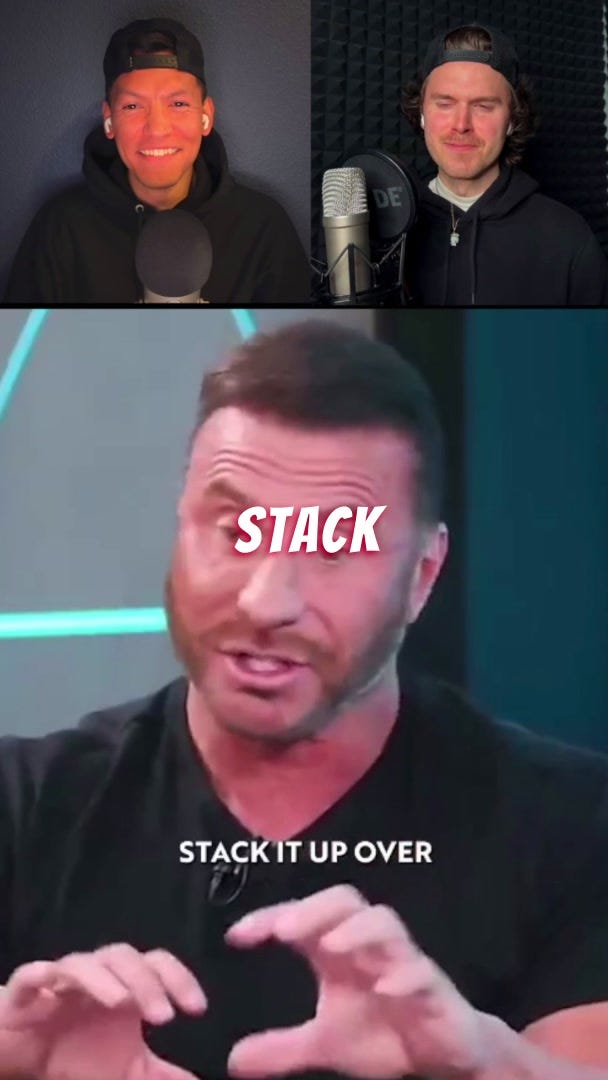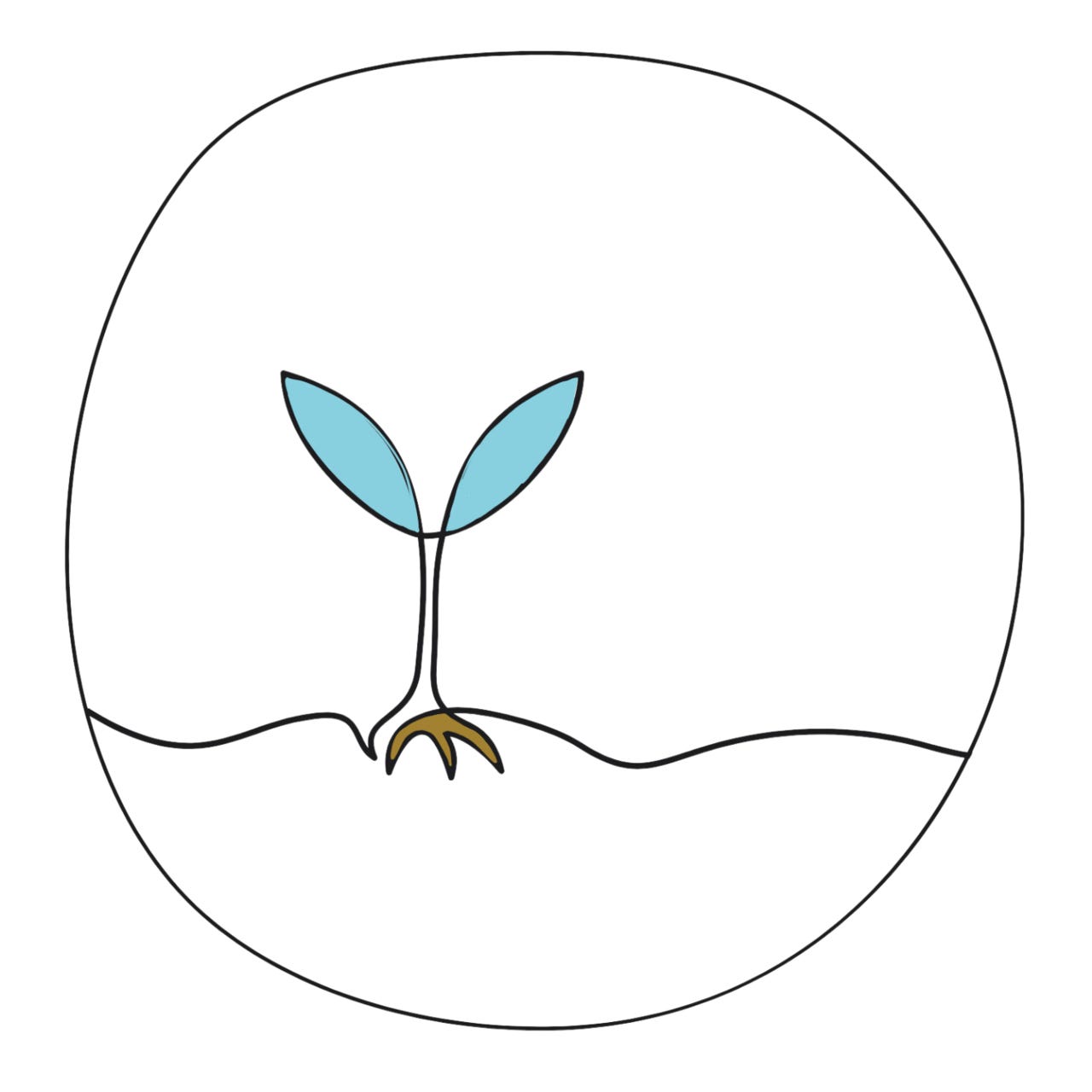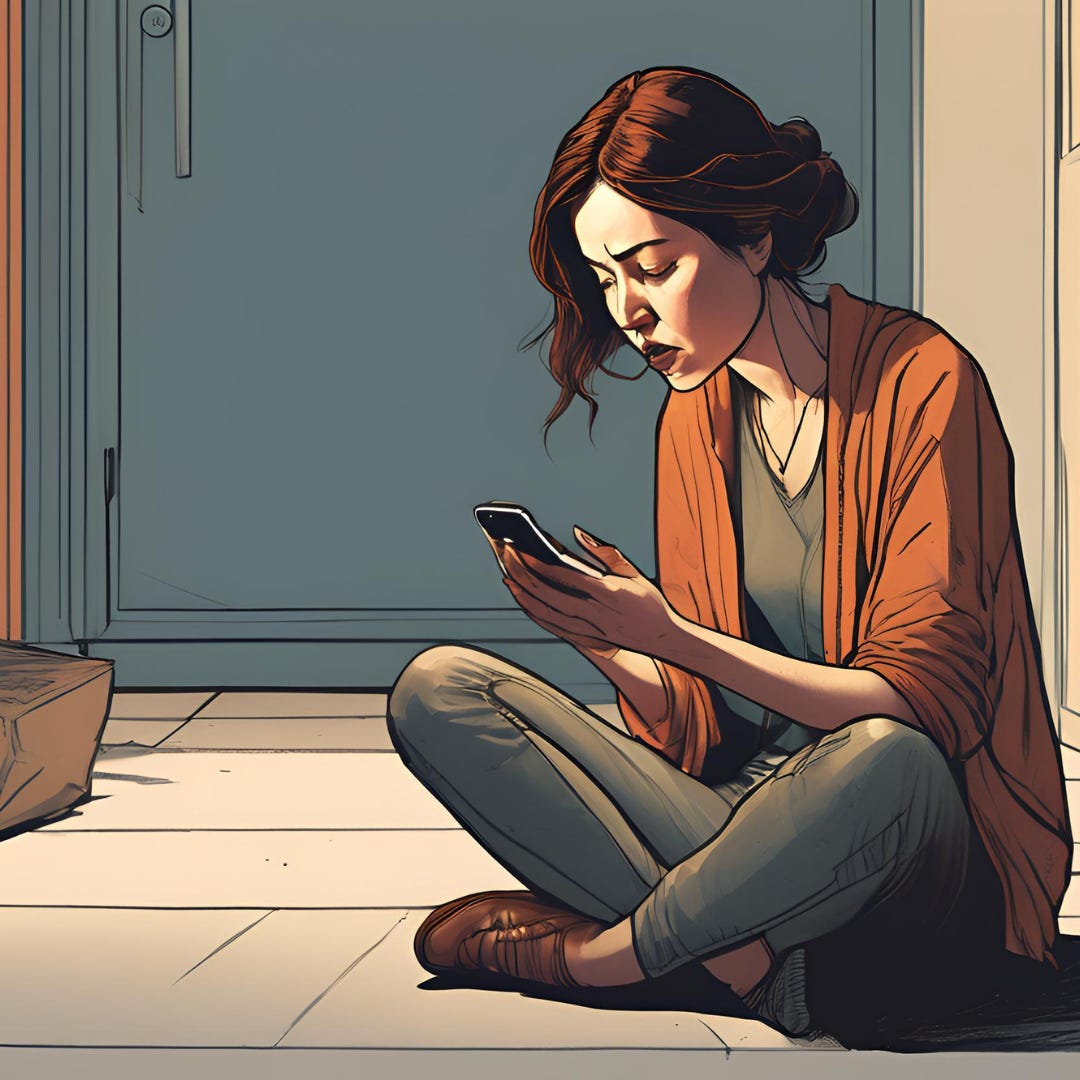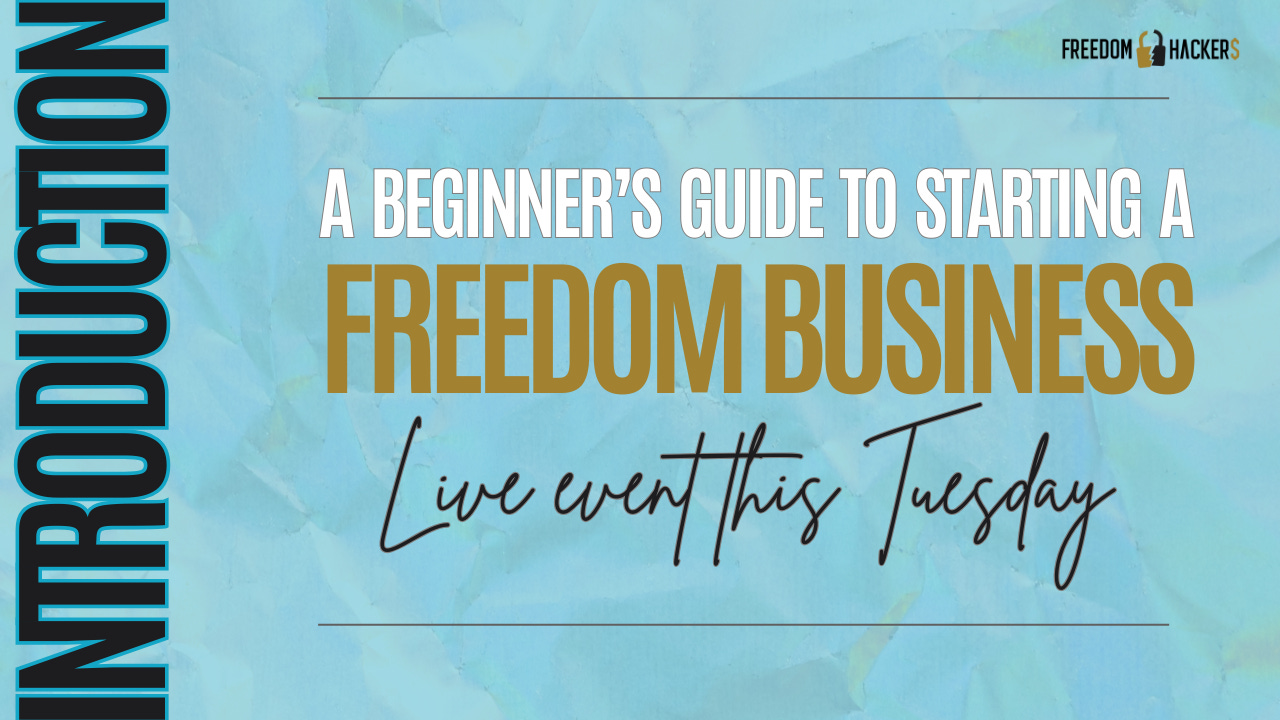I keep getting slammed by a YouTube ad for an app that plays the role of therapist. It’s immensely persistent, even though I skip it each time.
And it’s clearly aimed at people in their twenties, way younger and more hip than me. It made me think about how so many people seem to have a therapist these days. Therapists are dropped in conversation as though it’s as common to have one as it is a dog. There’s an ownership there that I feel curious about, which has piqued my attention to pull on more than once.
“MY therapist said X.”
“I’m going to check in with MY therapist to see what they say about Y.”
Now, let’s be clear, I’m not dissing having a therapist. I might not ever have had one, but I’d be lying if I said that I didn’t believe they could help me iron out a thing or two. 😬
No, this article isn’t about therapists. It’s about what I think leaning on a therapist (or anyone else external to yourself) might mean, in the context of daily habits and the larger world.
I’ve mentioned many times on My Mama Summer that I’d like to slow my life down. Simplicity and seasonality are the theme of the coming year/s for me, as I realise life is buzzing by and I don’t like the feeling that comes with not knowing how to stop it. Maybe I should see a therapist? (haha)
I’ve spent a decade in the entrepreneurial world taking on the advice of hustling men like Ed Mylett, who recommended I split my day into 3 days and work from 6am until midnight.

 Tiktok failed to load.
Tiktok failed to load.Enable 3rd party cookies or use another browser
Or Robin Sharma, whose answer is joining an elite club of superbeings who rise at 5am every day.
“Win the morning and you win the day,” hounds Tim Ferriss.
Now, I’ve now entered a seemingly radical era for myself, which I’ve dubbed my Simplicity Era.
In this era, less is more.
My co-sleeping, boobie-drinking, always waking me in the night toddler and I much prefer this era to the hustle. Waking at 5am is NOT for me. I prefer the glorious days when my husband lets me sleep until 11.30am. Why isn’t that an elite club with a waitlist?
No, Ed. My goal in life isn’t to squeeze as much work out of the day as I can while my happiness and life force wane. My goal is to squeeze more life out of every day.
And this year, as slow productivity master and refreshing antidote to hustle culture, Cal Newport, suggests in his book, Slow Productivity, I’m doing that by working on a maximum of 3 projects at a time. They are:
Growing this publication and it’s accompanying podcast, My Mama Summer
Mentoring my business community, Freedom Hackers, and growing it’s new Substack publication, Simplicity Business.
And, most importantly, MYSELF (a project that hasn’t seen the light of day for years).
I’m capping my work hours at 20, removing social media from my orbit, focussing on deep work, outsourcing tasks that sap my life force, taking up wool felting, reconnecting with one of my all-time passions - dancing, healing my body and psyche, and, of course, documenting it all along the way.
You’ll find the behind the scenes of my business growth in my brand new, sister publication, Simplicity Business.
I’m recalibrating to my own inner compass. Not culture’s, my coach’s, or that of an organised religion or anyone else. Put simply, I’m minimising what goes in, maximising what comes out, and slowing TF down in every way.
I’m not the only human feeling the need to implement radical change like this. The frantic pace of modern life has many people—including myself—overwhelmed and burnt out. As I mentioned in this recent article about the rise of ADULT ADHD, there’s input thrown at us from every direction. And little time or place to just stop and smell the roses.
“Simply put, humans are not wired to be constantly wired.”
― Cal Newport, Digital Minimalism: Choosing a Focused Life in a Noisy World
And as we’ve moved into the digital era, we’ve lost the art of listening to ourselves. How can we listen to ourselves when we never stop?
So much of the dysfunction we see around us is a result of this. We rely too much on externality to guide us, instead deferring to others at every opportunity.
Therapists. Social media followers. Oracle Cards. Culture. Friends. Gurus. Plant medicine. Jesus. The Bible. Medical Experts. Channellers. The quantum field. Light language. Human Design. Crystals. Angels. Coaches.
There’s a nuance to this conversation. I’m not saying all tools are inherently bad—but that using them incorrectly is. Whether we’re pouring our heart out on our therapist’s sofa, calling our coach, or consulting our guides, it’s all looking to someone or something else for the answer.
But, as Joseph Campbell says, “The cave you fear to enter holds the treasure you seek.”
Have we lost the art of looking inward for answers instead of towards others? Because that’s where the gold lies.
Often we trick ourselves into feeling like we’re going within.
We book a jungle retreat to sit with the medicine, asking a plant and shaman to guide us to the answers.
We hop on social media to check how the herd is reacting.
We scour a search engine for answers.
We fit in with culture, censor ourselves from speaking our truth, and halt our self-expression to appease others.
We look to our peers instead of our families for answers. And we train our kids to do the same.
“For the first time in history young people are turning for instruction, modeling, and guidance not to mothers, fathers, teachers, and other responsible adults but to people whom nature never intended to place in a parenting role—their own peers.”
—Gabor Mate, Hold On To Your Kids
We seek out books and podcasts that throw research, beliefs, and opinions at us.
We seek out psychics and channellers connected to other realms in an effort to understand our own.
We idolise Gods and gurus, and books that proclaim to share “The Word”.
And rarely, it ever stops.
The constant stream of input is nauseating. Paralysing, even.
And if you look around, you see it everywhere.
But my idea for this article didn’t come from the internet or my phone. It was a shower thought that came out of my consciousness when I had a precious, scarce moment to myself.
The next time you’re in public, observe the people around you to see what happens when they have a moment to themselves. What are they most likely to do?
Do they people watch? Take deep breaths? Move or stretch their body? Help others with a door or their shopping? Engage someone in conversation? Close their eyes and reconnect to themselves? No.
They probably take out their phone and start tapping on apps. When they get bored of the first one, they’ll exit and enter a new one. Entering world after world after world. Plugging in input after input after input.
Is it addiction? A coping mechanism? Escapism? A habit? Time for ourselves? Preventing FOMO? Seeking connection? Zoning out? Revenge bedtime procrastination? False productivity? Being afraid of boredom?
It’s all of these things. And the result is the demise of the internal compass.
The Smartphone’s Role in Our Devolution
“My self-loathing is positively correlated to the number of hours I spend ‘using’ my phone (emphasis on the active ‘using’ because I feel most days as if my phone has instead been using me). I feel irritable if I don’t have my phone in moments of solitude and transition—on TRAX, walking to class, eating lunch, at the gym. I can’t explain it, but in these moments, I feel like I’m missing a limb. What’s more, I feel the uncontrollable desire to keep using when I’ve picked up my phone.”
The anonymous university student I quoted above describes a common complaint from phone users who attempt a digital detox—without their phone in hand, they feel like something is missing from their life.
They think it’s their phone. But instead, an absence of their incessant, unconscious scrolling and swiping unmasks a gaping hole they never knew existed. A beautiful—and uncomfortable—diversity of feelings, things and experiences exist outside of their screen awaiting their attention.
Will they uncover them? Or snuff them out?
When we spend our waking hours plugging ourselves into screens at every opportunity, we rob ourselves of solitude, boredom, walking in nature, reading books and magazines, connecting with others, art and crafts, thinking, reflecting, and pondering.
Constant noise replaces solitude. Airpods in our ears while we walk. The TV blaring while we eat dinner. Beats thumping while we workout. An ever-present undercurrent of dissonance and inability to be present in our environment for fear of missing out on something elsewhere.
Mentally, we find ourselves with little inner knowledge and a reliance on the internet for answers to simple questions we once embodied the answers to. We don’t trust ourselves any more. Intuition? What’s that? We’ve outsourced our hearts, guts, and brains to Siri, Alexa, and now ChatGPT.
I realized I depended a lot on my cellphone and the Internet to reinforce the knowledge I thought I carried with me.1
Psychologically, we compare ourselves to others we don’t even want to be like, we talk ourselves out of reaching for our dreams, our self worth takes a beating, and we stop prioritising in-person relationships and friendships because we feel like our online ones are sufficient. Until we realise they aren’t.
And on a physical level, being plugged-in results in an inability for us to concentrate, focus and complete deep work, interrupts our circadian rhythm, and creates an inability for us to BE with ourselves.
And then, we pass the disconnection, dysfunction, and dysregulation on. As adults give their kids phone access, they reproduce their own habits in children who don’t have the context or capacity to understand the repercussions.
The Inner Self vs the Technosphere
What happens when kids grow up not understanding the value of solitude? Worse still, where brief moments of solitude like standing in line are so uncomfortable for them they can’t help but reach into their pocket for a quick hit of TikTok.
How damaging is it for children to have no reference point for how it feels to reference our inner self, rather than the technosphere? And what larger effect does this have on the world and its people?
I believe it makes us more easy to manipulate, more pliable and controllable, and less grounded and centred.
Jean M. Twenge has spent 25 years researching differences between generations. In a 2017 article for the Atlantic she asked the question, have smartphones destroyed a generation?
In her research, Twenge noticed a dramatic shift in the daily habits, psychology, behaviour, and mental health of teens post-2012 (this year was the tipping point where 50% of Americans now owned a smartphone).
I’m part of the Millennial generation. We grew up with an analogue childhood and grew into a digital adulthood. I plugged myself into the internet in my mid-twenties and am woefully difficult to contact on my phone. In contrast, these kids do not remember a time before the internet.
“The arrival of the smartphone has radically changed every aspect of teenagers’ lives, from the nature of their social interactions to their mental health. These changes have affected young people in every corner of the nation and in every type of household. The trends appear among teens poor and rich; of every ethnic background; in cities, suburbs, and small towns. Where there are cell towers, there are teens living their lives on their smartphone.”2
It blew my mind to read that modern kids aren’t excited about traversing the same milestones I was—walking around the shopping centre with my friends sans-adults, getting my driver’s licence, telling a boy I “liked him”, losing my virginity, getting a job so I could have my OWN money and buy what I wanted to—like a car (aka my freedom).
And the evidence shows, this change is related to the rise in teen smartphone use. Giving young people devices is not improving their lives, it’s making them “seriously unhappy.”3 (It does the same for adults too.)
Without exception, teens who spend more time than average on screen activities are more likely to be unhappy. ALL screen activities are linked to less happiness. “Eighth-graders who spend 10 or more hours a week on social media are 56 percent more likely to say they’re unhappy than those who devote less time to social media.” Worse still, “Teens who spend three hours a day or more on electronic devices are 35 percent more likely to have a risk factor for suicide, such as making a suicide plan.”4
I shuddered reading that. Kids are sitting in their rooms alone on their phones making suicide plans? Parent’s, we’re way off track here. Why are we giving kids phones? Why are we even using phones ourselves? Is it time for a revival of the homing pigeon? Where can I buy myself an owl? I shall name her Hedwig.
The Dangers of Distracted Parenting
Now, as much as we’ve spoken about the dangers of devices and screen time for kids here, it’s important to shine that light on ourselves and OUR screen time. Thanks to the omnipresence of devices, many parents suffer from “continuous partial attention”, which is harming our kids even more.
“Occasional parental inattention is not catastrophic (and may even build resilience), but chronic distraction is another story. Smartphone use has been associated with a familiar sign of addiction: Distracted adults grow irritable when their phone use is interrupted; they not only miss emotional cues but actually misread them.
A tuned-out parent may be quicker to anger than an engaged one, assuming that a child is trying to be manipulative when, in reality, she just wants attention. Short, deliberate separations can of course be harmless, even healthy, for parent and child alike (especially as children get older and require more independence). But that sort of separation is different from the inattention that occurs when a parent is with a child but communicating through his or her nonengagement that the child is less valuable than an email.
A mother telling kids to go out and play, a father saying he needs to concentrate on a chore for the next half hour—these are entirely reasonable responses to the competing demands of adult life. What’s going on today, however, is the rise of unpredictable care, governed by the beeps and enticements of smartphones. This is the worst possible model of parenting—we are always present physically, thereby blocking kids’ autonomy, yet only fitfully present emotionally.”5
For those of us who have built our lives around businesses that require us to be online all the time, it can be challenging to switch off. I’ve found having rules around which devices I use for what purposes and when to be incredibly rewarding.
Some of those guidelines are:
I don’t use social media or email on my phone. I work only on my laptop for a specific period of time and when I close it, I’m done.
I don’t have notifications interrupting my precious time with my daughter (much to the dismay of many of the people I love who try and contact me regularly). On the flip side, I’m a delight to meet with in-person because when I’m with you, I’m WITH you.
I added these limits in so I have clear separation between work and life. And even still, those limits are getting a reshuffle and will be tightened this year as I move into my Simplicity Era.
This year, I’m going inward much more than I have before. Previously, I’ve shared the mentors I’m working with for the year in specific areas. I feel no pull to do that this year. For better or worse, I’m tuning back in to myself as the mentor. Of course, I’ll read books, listen to podcasts, and allow ideas to incubate. But first and foremost, I’ll combine that information with my inner knowing, let it percolate, and then come out into the world infused with a little bit of Aimee.
As I see it, this is incredibly important. There's a difference between relying on external factors and being externally referenced, rather than from the inside and knowing who we are, how we feel, what we want, and allowing that to project out into the world.
When we're unsure of who we are, what we want, what our values are, and where we stand, we're incredibly susceptible to misaligned ideas, projects, and programming, whether it's culture, social media, channellers, the Bible, the planets, or whatever it might be.
This year, I look forward to noticing more of what matters in life. I plan to make use of a Sit Spot, as Meagan-Rose Wilson recommended in her podcast with me; watching the daily rhythm and the seasons as they change.
I plan to move my body.
I plan to listen first and foremost to my inner compass, rather than any coach, mentor, or guru. And any advice I do ask for will be put through the filter of my intuition, inner knowing, and instinct.
I plan to slow down and welcome solitude into my life, rather than disregard it as our culture has.
I plan to grow my business in accordance with these principles and my values.
I plan to share how I feel and what changes for me as this experiment unfolds.
I like to imagine a world where we no longer need endless external guidance, inputs, apps, or devices to feel whole.
Instead of waiting for that reality, I’m creating it. A 'Simplicity Era' where intuition, rhythm, and slow living guide my actions. I know the answers aren’t out there; they’re within. Reclaiming my internal compass is a journey I’m wholeheartedly committed to. And I invite you to do the same. Will you join me?
Aimee
x
References
https://dailyutahchronicle.com/2015/11/05/five-steps-to-help-you-break-free-of-smartphone-dependency/
https://www.theatlantic.com/magazine/archive/2017/09/has-the-smartphone-destroyed-a-generation/534198/
Ibid.
Ibid.
https://www.theatlantic.com/magazine/archive/2018/07/the-dangers-of-distracted-parenting/561752/










Great article! I love the idea of setting guidelines around tech use so it doesn't totally take over. I still love analogue life like reading, notebooks and dancing.